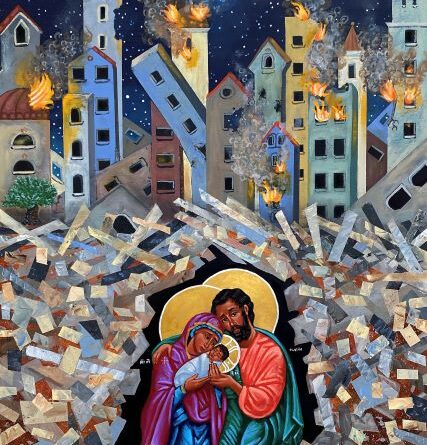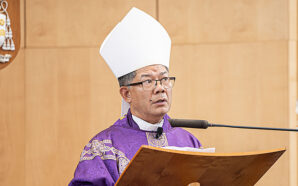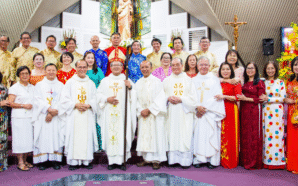Most Reverend Vincent Long Van Nguyen OFM Conv DD STL, Bishop of Parramatta
Homily for Christmas Eve, 2023.
Readings: Readings: Isaiah 9:1-7; Titus 2:11-14; Luke 2:1-20
24 December 2023
Living the scandal of the crib.
Dear brothers and sisters,
Recently, I came across a rather confronting depiction of the manger scene. Instead of the usual Hallmark Christmas cards with beautiful sky, manicured pine trees, and snow-capped mountains in the background, this one has a gloomy sky, buildings on fire and a frightened Holy Family huddled under the ruins. “Christ in the Rubble” is the title of this confronting image. It is a project of Red Letter Christians, a movement of believers who endeavour to live out Jesus’ counter-cultural message.
Amid all the challenges we face individually and collectively, “Christ in the Rubble” impels us to think about the ways our beliefs and actions -or lack thereof- contribute to the loss and diminishment of life in the world. How can we shape a culture of Christianity where love truly has no boundaries? How can we create an environment where the dispensable, poor, refugee, vulnerable Palestinian Saviour would be cherished had he been born today? For if the birth of the child Emmanuel symbolises God’s commitment to the world, then our faith in this incarnate God must bind us in human solidarity and stewardship of all creation.
This is what we endeavour to do as a Gospel-centred community. The Church at its best is the embodiment of the divine project. As followers of Christ, we are called to act as catalysts for the transformation of the world in accordance with God’s plan. We are not meant to be comfortable with the status quo but to model a new way of living and relating that is in sync with the movement of the living spirit. We are inspired to be a force of leaven and a headlight leading the human community to higher levels of justice, inclusion and flourishing for all.
On this solemn night, as we come to worship the Christ child, born to be our Saviour, we are challenged by a scandalous theophany. God’s greatest revelation is not through power, majesty, wealth and splendour. Rather, he made himself the poorest, the most vulnerable and despised of all. The Incarnation enacts the kind of divine love that makes itself known to the lowliest, the godless and the godforsaken. It is as scandalous and subversive as the self-abasement of the Crucifixion. Hence, we cannot be channels of the Emmanuel without embracing vulnerability.
In the first reading, Isaiah speaks of the coming of Messiah who would inaugurate a new reign of justice and integrity. The prophet, however, describes this hero figure not in conventional terms of power and dominance. He alludes to the way God brought about the unlikely victory over the Midianites despite Israel’s inferior forces. Thus, quite contrary to the imperial ideology, the winners-take-all system and trickle-down political paradigm will be replaced by the new social order that favours the disadvantaged and the weak. The Messiah will be manifested as a Prince of Peace who will restore the exiled and dignify the oppressed. This prophecy, in effect, subverts the script of the empire and points to God’s vision of a new world through non-violence, solidarity and distributive justice.
Like Isaiah, Luke writing 800 years later describes the birth of Jesus as the new messianic era for humanity. “I bring you news of great joy”, the angel said to shepherds, “a joy to be shared by the whole people. Today in the town of David, a saviour has been born to you”. With this announcement, a new dawn had arrived for them, for humanity and indeed for the whole of creation. The birth of Jesus was framed with a backdrop of imperial census that meant heavier tax burdens and economic exploitation. The Holy Family was, like many of the poor today, victim of an unjust social system. Yet with the arrival of the Messiah, the reign of God prevailed over against the rule of greed, selfishness and corruption.
Dear brothers and sisters,
This year as a Franciscan, I am reminded of St Francis’ live recreation of the First Christmas 800 years ago in Greccio. At a time when Jesus was often depicted as a conquering, victorious king on a throne, a God-view used to justify crusades and other conversion-focused missions, Francis helped people refocus on the humanity and humility of Christ. Like “Christ in the Rubble”, Greccio challenges us to live the scandal of the crib as much as the scandal of the cross.
Let us commit ourselves to the task of building a new future at home and abroad. As believers, we cannot remain indifferent to the issues that impact the lives of our brothers and sisters, whether it is the conflict between Israelis and Palestinians, the war in Ukraine, the ecological crisis, the reconciliation with our indigenous in the aftermath of the Referendum etc. The birth of Jesus signals God’s alignment with those who are at the edges of society. Let us pattern our lives on the self-emptying God. Let us learn to abandon our default position of self-interest and mutual exclusion that leads to an unsustainable future. Let us show to others the alternative future that is inspired and guided by the vision of the God of vulnerability and radical communion. This Christmas, as we contemplate the Christ child in the manger, let us commit ourselves to pray and work for justice in all its manifestations so that God’s reign will come in our world.







